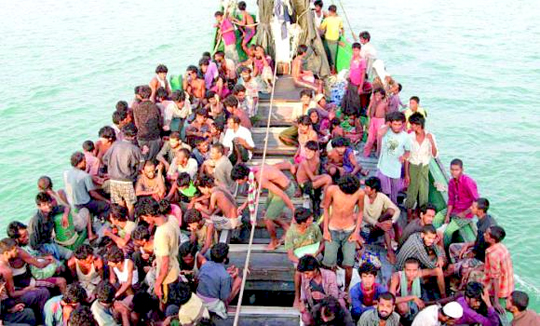Haigyi island, Jun 1: Myanmar refused on Sunday to let journalists approach a remote island where more than 700 migrants are said to be held following their rescue last week.
Myanmar's navy briefly detained and turned back journalists near a migrant boat being held off the country's southern coast, as officials remained guarded over what would be done with the people on board.
Before being turned away, Reuters reporters saw hundreds of migrants — some rake thin — crammed on the deck of the converted Thai fishing boat that had been intercepted in the Andaman Sea on Friday and held in the waters off Leik island.
Some were sat on two of the four Myanmar Navy vessels standing off the fishing boat, which had been discovered carrying 727 migrants.
Reporters have been trying to access Thamee Hla Island at the mouth of the Irrawaddy since the authorities announced that 727 people, including 74 women and 45 children, had been found drifting in a boat off Myanmar's coast and had been taken there.
They are part of a recent exodus of persecuted Myanmar Rohingya Muslims and Bangladeshi economic migrants who have fled the region en masse in a crisis that regional nations have struggled to deal with.
Journalists who tried to take small boats out to Thamee Hla Island were being turned around by navy patrol vessels and were ordered to delete any footage on their memory cards, said an AFP reporter on the nearby island of Haigyi.
Those returning said they had been ordered to sign documents promising not to try to make the journey again.
A naval officer, who declined to be named because he was not authorized to speak to the media, said the boat had been found drifting at sea with no fuel or anchor, and was taking on water.
“Their water pump was broken. If we hadn't found them, they may have died,” the officer said.
Migrant boats are a hugely sensitive topic in Myanmar. Its discovery of two vessels crammed with people in recent weeks has deepened a tug of war between neighbouring Bangladesh and the formerly army-ruled nation over who is responsible for migrants found in the Bay of Bengal.
Myanmar refuses to recognise its 1.3 million Rohingya living in the western state of Rakhine as citizens. Instead it refers to them as “Bengalis” and alleges they are illegal immigrants from across the border.
They face daily discrimination including controls on their movements, family size and access to jobs, forcing tens of thousands to flee overseas, usually to Malaysia. That exodus increased dramatically after 2012 when scores were killed in communal bloodletting in Rakhine.
Myanmar has been keen to portray those leaving its shores as Bangladeshi economic migrants and rejects widespread criticism that its treatment of the Rohingya is one of the root causes of the current exodus.
On Saturday a local official from Haigyi Island said the migrants were all Bangladeshis and would be taken to an area near the Bangladesh border in Rakhine state in the coming days.
But Bangladesh has insisted it will not take back any migrants who trace their origin to Myanmar.
And because Myanmar authorities refuse to use the term Rohingya, it is difficult to ascertain where exactly the migrants come from.
No media or aid group has yet been able to meet the migrants held on Thamee Hla Island to verify where they say they originate from.
A lucrative people-smuggling trade has long thrived in the region, largely ignored or colluded at by the authorities. But a recent crackdown by Thai police in the country's deep south threw smuggling networks into chaos as gangmasters abandoned their victims on land and sea.
In recent weeks more than 3,500 migrants have turned up on Thai, Malaysian or Indonesian soil and an estimated 2,500 more are still stranded at sea.
The government initially labeled the migrants “Bengalis,” a term used to refer to both stateless Rohingya Muslims and Bangladeshis, but officials later said they believed most of those on board were from Bangladesh.
Myanmar has come under harsh criticism for its treatment of Rohingya, more than 100,000 have fled persecution and poverty in Rakhine State in 2012.
More than 4,000 Rohingya and Bangladeshis have landed in rickety boats throughout Southeast Asia in the last month following a crackdown on human trafficking in Thailand.
Myanmar's sensitivity over the migrant crisis was evident by the way its navy responded to the arrival of the journalists' boat.
At one stage, a sailor leaned over the rail of a navy boat to point his rifle at the approaching journalists. Reporters from Reuters and other foreign media were questioned and made to delete pictures and videos before they were ordered to return.
Myanmar officials have given little information on what it intends to do with the migrants.
Government spokesman Ye Htut said: “They are still on the boat. We are providing them with the necessary humanitarian assistance.”
Officials have said the boat would possibly be taken to Rakhine State, in the country's west, or to neighbouring Bangladesh.






Comments
Add new comment